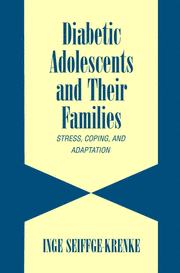Book contents
- Frontmatter
- Contents
- Foreword by Stuart T. Hauser
- Preface
- 1 Epidemiology of Chronic Illnesses in Adolescence
- 2 Coping with Illness in Adolescence: An Overview of Research from the Past 25 Years
- 3 Coping with Diabetes: A Longitudinal Study
- 4 Knowledge of the Illness, Compliance, and Patient–Physician Relationships
- 5 Self-Concept, Body Image, and Perceived Health
- 6 Adolescent, Parental, and Family Coping with Stressors
- 7 Chronic Illness and the Family: The Perspectives of Mothers, Fathers, and Siblings
- 8 Friendships, Romantic Relationships, School, and Career
- 9 Successful Adaptation or the Development of Psychopathology?
- 10 Pathways for Resolving the Dilemma between Developmental Progression and Adaptation to the Illness
- 11 Implications for Prevention and Intervention
- References
- Index
10 - Pathways for Resolving the Dilemma between Developmental Progression and Adaptation to the Illness
Published online by Cambridge University Press: 06 August 2009
- Frontmatter
- Contents
- Foreword by Stuart T. Hauser
- Preface
- 1 Epidemiology of Chronic Illnesses in Adolescence
- 2 Coping with Illness in Adolescence: An Overview of Research from the Past 25 Years
- 3 Coping with Diabetes: A Longitudinal Study
- 4 Knowledge of the Illness, Compliance, and Patient–Physician Relationships
- 5 Self-Concept, Body Image, and Perceived Health
- 6 Adolescent, Parental, and Family Coping with Stressors
- 7 Chronic Illness and the Family: The Perspectives of Mothers, Fathers, and Siblings
- 8 Friendships, Romantic Relationships, School, and Career
- 9 Successful Adaptation or the Development of Psychopathology?
- 10 Pathways for Resolving the Dilemma between Developmental Progression and Adaptation to the Illness
- 11 Implications for Prevention and Intervention
- References
- Index
Summary
In chapter 9 we pointed out that coping with a chronic illness must be considered within the developmental context. Many developmental tasks must be solved within the relatively limited period of 5 to 10 years. In his research work on healthy adolescents, John Coleman was impressed by their enormous coping abilities and surprised that so few adolescents failed in coping with the abundance and diversity of developmental tasks with which they were confronted. In an attempt to explain these observations, he put forth his focal theory of development (Coleman, 1978), according to which successful development occurs through a process of continually focusing on and tackling relevant developmental tasks. Adolescents focus on the most urgent tasks and work sequentially through the tasks that appear most important at each developmental stage. The process of adaptation is extended over several years, so that different tasks come into focus and are dealt with at different times.
As has been detailed throughout this book, however, illness-related stressors and developmental tasks occur simultaneously, not sequentially. Chronically ill adolescents cannot wait until they have successfully dealtwith the illness before tackling important developmental tasks: They must strive to maintain a delicate balance between following the course of normative developmental progression and maintaining good physical health (Seiffge-Krenke, 1998c). The previous chapter demonstrated that diabetic adolescents focus on achieving professional competence, in which they make enormous progress over the 4 years, compared with other developmental tasks.
- Type
- Chapter
- Information
- Diabetic Adolescents and their FamiliesStress, Coping, and Adaptation, pp. 232 - 258Publisher: Cambridge University PressPrint publication year: 2001

